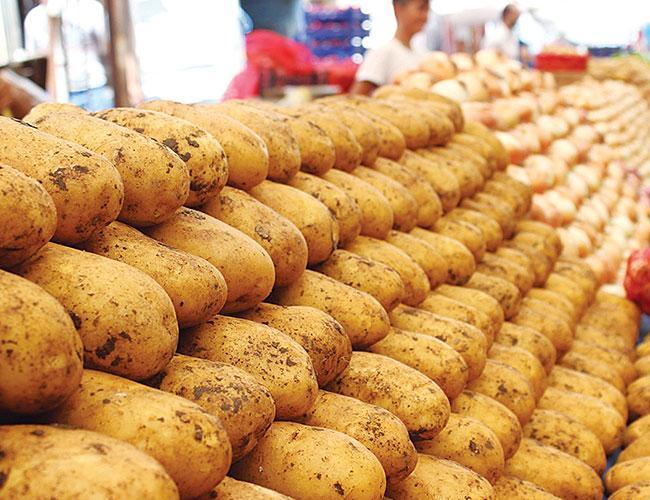Potato: Onion parity

The Mining Engineering Department of the Middle East Technical University (ODTÜ) in Ankara has discovered two valuable subterranean sources of economic value in Turkey: The potato and the onion.
The students have proudly demonstrated their discovery in the graduation ceremony. The ODTÜ graduation ceremony, which is held in early July, is always a delight to watch every other year, a long tradition in the history of the 62-year-old university. The graduate students march along the stadium carrying fun-placards, often heavy with political messages, also rich with jokes relevant to their departments, and the notoriously strenuous education of the university, the most prestigious in the country. The messages are always witty with a high sense of humor with clever wordplays.
The Mining Department’s finding of potatoes and onions as an economic asset is a satirical message referring to the shocking rise in potato and onion prices. The skyrocketing prices of the two most humble staple foods of the country had previously stirred much debate prior to the elections. Jokes were circulated comparing them with the ever-rising foreign currency against the Turkish Lira. Potato’s parity with the euro, onion’s parity with the dollar, or vice versa; these were the absurd discussion topics in the insanely crazy Turkish economics. Another hilarious banner suggested utilizing “under-the- pillow onions” referring to the under-the-mattress saving habit in Turkey, now that onions are almost worth its weight as dollar or euro. Some quotes reflected the cry of new graduates that made everyone smile bitterly. One monthly wage expectation of a graduate was summarized as 700 kg potatoes plus free Sodexho lunch tickets, which might actually be a good starting salary for an engineer.
Considered as poor man’s rescue, onion is native to Anatolia, used in almost every single dish. A typical “tencere yemeği,” the usual one-pot dish starts with sweating onions in butter or oil. It is unthinkable to cook without onions, as most cooking techniques in Turkish cuisine start by making this onion sofrito. Potato, on the other hand, was a novelty that came from the New World. Despite being a foreign product, the potato was embraced with love by the Turkish people, as it was filling and added body to the ubiquitous pot dishes. The first ever-printed Ottoman potato recipe was a beef stew, “Istofato kum patates,” apparently a borrowed idea from Western cuisines. The idea was new in early 19th century but it was easily accepted. Once a potato or two was sliced in a stew, it extended the dish contributing to home economy, its rather bland but pleasant taste adapted easily to all the other ingredients of the Turkish cuisine. Eventually potato became one of the staple foods of Turkey. It was always locally grown but now we are in a situation to import potatoes from Syria. Regardless of their exchange rate, potatoes and onions are in the heart of Turkish cuisine. Hopefully they will remain so, and feed the souls of the poor.
Having been graduated from ODTÜ during the turbulent years of the 1980’s, I regret that we never had those fun graduation ceremonies. But it was my weekly ritual to skip the boring technical classes of the architecture department, strangely always scheduled for Friday afternoons, and go for a beer or two (or several to admit), munching several servings of freshly fried potatoes. I remember fondly those idle escapes from the campus.
Now go and indulge yourself with a splash of luxury, have some fried chips and onions. Life is short, best to enjoy it now!
Recipe of the Week: New potatoes are the delight of mid-summer nights of Nordic countries. Just plain boiled, dipped in salt and eaten out of hand, it is a pleasure to enjoy the starchy satisfaction, simply and deliciously. In my childhood we used to have boiled potatoes in picnics all the time, almost always accompanied with spring onions. But when at home frying a batch or two while watching the World Cup finals is a good choice. After all we have to splurge and pamper ourselves with some extravaganza now and then, don’t we? Try cold frying method this time. Wash and scrub potatoes until all soil and dirt are washed away. Slice potatoes lengthwise in fingers (do not peel, why waste precious material); pat dry with kitchen towel to absorb excess starch; put in a wide deep pan and pour frying oil over, enough to cover liberally, move around the potatoes slightly to ensure that they are swimming freely. Heat the pan until the oil is bubbly, when the potatoes start to gain color, turn them around a few times to fry evenly. Slightly increase the heat and when they turn crisp and golden, remove from the oil with tongs or a slotted spoon. Drain excess oil on kitchen paper, salt and serve. You may use the remaining hot oil to fry batter-dipped onion rings. Prepare a batter of flour with equal amount of beer, salt to taste, slice thickly or quarter the onions, separate the layers, dip onion rings or wedges in the batter and fry in remaining hot oil. Oh God luxury is good!
Cork of the Week: When potatoes and onions are on the table, so has to be a bottle of good hearty beer. Summer IPA of Garaguzu is a favorite of mine, a hoppy-happy choice; another beer to gulp is Bomonti Fabrika, much loved filtered Lager of Bomonti factory, produced close to the original recipe now on the shelves in its new summer outfit, in bright refreshing cool silver cans.












